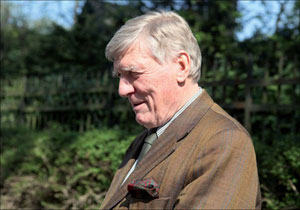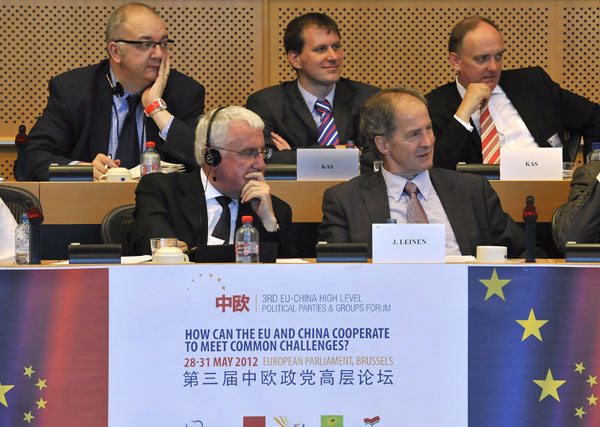Europeans keen to share experience with Party
Updated: 2012-11-14 07:51
By Fu Jing (China Daily)
|
||||||||
Economic management, planning considered key areas of Chinese expertise, reports Fu Jing in Brussels.
Many Western political parties were once hesitant about deepening dialogue with the Communist Party of China but Pierre Defraigne is convinced that now is the right time to form closer ties and share the experience of managing China's fast-track economy.
Defraigne is executive director of Brussels think tank The Madariaga - College of Europe Foundation.
|
 |
|
Pierre Defraigne, executive director of one of Europe's major think tanks. PROVIDED TO CHINA DAILY |
He has been impressed with the CPC's long-term planning and vision, qualities he feels are lacking in Western parties across the political spectrum.
Targets, such as the country's five-year plans, and sound management skills have resulted in the Party arguably outperforming Western policymakers in dealing with the global financial and debt crises, he said.
"The Western world is in a mess now, and its handling of the financial and debt crises has been a terrible economic and social waste," he said.
"The West's task (in economic management) is much easier (in terms of economic size and technological advances), but it has failed in the key dimension of the economy," Defraigne said.
Western parties should reassess their attitudes when looking at the CPC, which faces tremendous social and environmental challenges, and should take full advantage of the opportunities to learn through their exchanges with it, according to Defraigne.
A deeper understanding
However, this positive opinion is a relatively new development in European political circles.
When the CPC first proposed holding political debates with the European parties, many people were skeptical. Martin Schulz, who at that time was chairman of the European Socialist group in the parliament, was among those who questioned whether the increased contacts would be beneficial.
"The CPC wanted all the parties to be involved. But to what extent could a debate be useful?" Schulz, who became president of the European Parliament in January, recalled as thinking.
As the CPC holds its 18th National Congress and undertakes a crucial leadership transition, Schulz admitted that the CPC's proposal was a "very good idea" and said the debates have helped deepen his understanding of the Party's function and vision. "The exchanges are open-minded, pluralistic and very important," he said.
Although the CPC has maintained close relations with European parties for decades, the European Parliament's tough stance against granting China "market economy" status, on arms embargoes and human rights, prompted the Chinese government to set up regular forums to exchange ideas with parties and groups.
Since May 2010, the CPC and eight political groups in the European Parliament, such as the center-right European People's Party and the Progressive Alliance of Socialists and Democrats, have held four closed-door political debates on global challenges and areas of cooperation between China and the EU.
"I attended two of the debates. I was very surprised by the political debate when I participated in Beijing," said Schulz, speaking at the headquarters of the Social Democratic Party of Germany, commonly known as the SPD, in Berlin.
Schulz is still a crucial member of Germany's oldest extant party and is active in the politics of his home country. He often spends Mondays in Berlin at meetings with his party peers and the SPD maintains close ties with the CPC.
From the dialogues and encounters, Schulz, who entered politics after a career as an independent bookseller, has gained great insight into the role of the CPC and the capabilities of the Chinese leadership.
Under the CPC's leadership, China has achieved rapid economic growth during recent decades and during the past 10 years has become one of the most important and powerful countries in the world, he said. "China's economic clout has reached the highest level. As a European, I am deeply impressed with the country," he added.
 |
|
The Third EU-China High-Level Political Parties and Groups Forum was held in Brussels in May. Wang Jiarui (not pictured), director of the CPC Central Committee's International Department, made a keynote speech at the forum, calling for further consensus and cooperation to meet the challenges ahead. PHOTO / XINHUA |

 Relief reaches isolated village
Relief reaches isolated village
 Rainfall poses new threats to quake-hit region
Rainfall poses new threats to quake-hit region
 Funerals begin for Boston bombing victims
Funerals begin for Boston bombing victims
 Quake takeaway from China's Air Force
Quake takeaway from China's Air Force
 Obama celebrates young inventors at science fair
Obama celebrates young inventors at science fair
 Earth Day marked around the world
Earth Day marked around the world
 Volunteer team helping students find sense of normalcy
Volunteer team helping students find sense of normalcy
 Ethnic groups quick to join rescue efforts
Ethnic groups quick to join rescue efforts
Most Viewed
Editor's Picks

|

|

|

|

|

|
Today's Top News
Health new priority for quake zone
Xi meets US top military officer
Japan's boats driven out of Diaoyu
China mulls online shopping legislation
Bird flu death toll rises to 22
Putin appoints new ambassador to China
Japanese ships blocked from Diaoyu Islands
Inspired by Guan, more Chinese pick up golf
US Weekly

|

|






